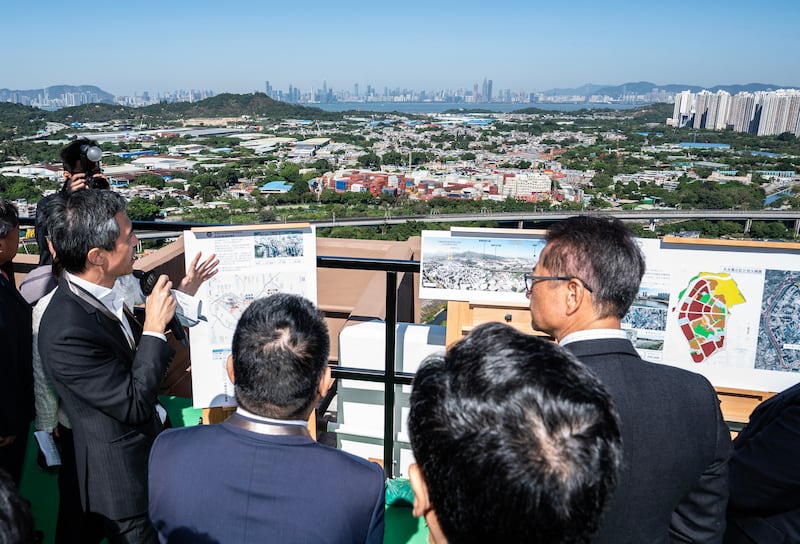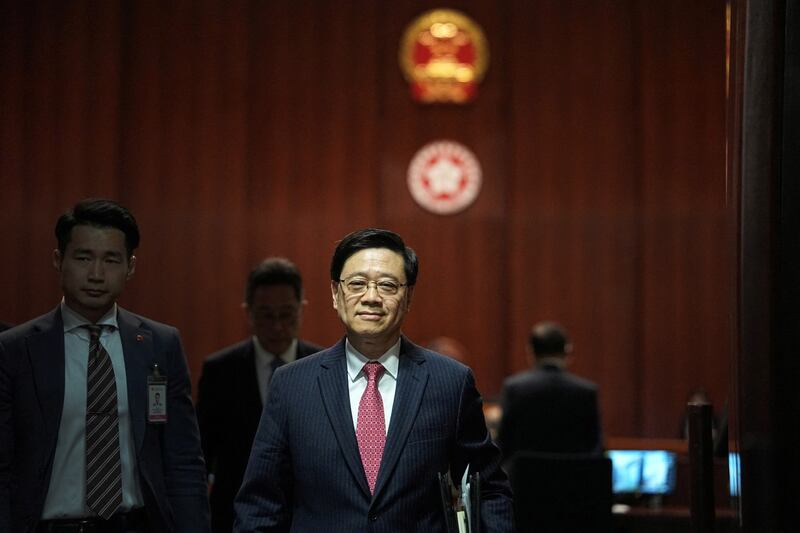Chinese state-owned enterprises are winning billions of dollars’ worth of contracts for work on massive China-linked development zones financed by the Hong Kong government, an investigation by RFA Cantonese has found.
The revelations come as the city government forecasts a budget deficit approaching HK$100 billion (US$12.9 billion) in the wake of public spending on COVID-19 measures.
A survey of the Hong Kong government’s tender website by RFA Cantonese showed that at least 14, or 30%, of the 45 contracts linked to the Northern Metropolis urban expansion project and Hetao Shenzhen-Hong Kong Science and Technology Innovation Co-operation Zone went to state-owned Chinese enterprises, including China Construction, China Railway Construction, China Geo-Engineering Group and China Road and Bridge Engineering.

Chinese state-sector involvement was also visible with the award of a contract to Hong Kong pilings giant Tysan Foundation, which was acquired by Chinese conglomerate HNA Group in 2016, and in joint ventures with Hong Kong and foreign companies.
And while they only secured 30% of the contracts by number, Chinese-backed bids won the lion’s share of the money, winning bids worth nearly HK$79 billion (US$10.1), or around 80% of the value of all contracts awarded on the two development zones.
Bulging deficit
The revelations come amid growing concern over the deficit ahead of the government’s budget on Feb. 26.
Taking into account proceeds from the issuance of government bonds, the latest projected consolidated deficit for 2024-25 will be “under HK$100 billion,” Secretary for Financial Services and the Treasury Christopher Hui told the city’s Legislative Council on Jan. 22.
Hong Kong’s fiscal reserves stood at HK$591.4 billion in November 2024, a sharp fall from HK$1,160.3 billion on March 31, 2020.

But there are signs that Beijing is keen for government spending to continue.
Beijing’s top official in charge of Hong Kong affairs, Xia Baolong, made a visit to Hetao Shenzhen-Hong Kong Science and Technology Innovation Co-operation Zone last week, just ahead of the budget.
He gave Financial Secretary and Acting Chief Executive Paul Chan “very clear instructions” on exactly how Beijing expects Hong Kong to contribute to national economic growth, Chan told reporters on Feb. 11, after accompanying Xia on his tour.
The instructions were “a great help in determining how to make full use of the Northern Metropolis and Hetao cooperation zone going forward,” Chan said.
‘A new engine for future development’
Meanwhile, Chief Executive John Lee told a Lunar New Year reception for Chinese companies on Feb. 14 hosted by Invest Hong Kong that his government would “drive development of the Greater Bay Area and Northern Metropolis to achieve economic growth.”
The government says the Northern Metropolis is “a new engine for the future development of Hong Kong [that] will inject new economic impetus into Hong Kong” by expanding future housing land supply.
The area, which the government hopes will become a metropolis of around 2.5 million people, is also destined for integration into China’s plan for a Greater Bay Area of interconnected cities around the Pearl River delta region.
“The Northern Metropolis is close to Shenzhen’s metropolitan core and the base of I&T industry with the greatest development momentum, and having seven land-based boundary control points, forging an essential platform for our cooperation with other Greater Bay Area cities,” according to its official website.
RELATED STORIES
Sluggish property revenues hit Hong Kong fiscal reserves
Trump’s China tariffs include Hong Kong, ending city’s separate status
EXPLAINED: How China hopes to kickstart its flagging economy
China calls on Hong Kong tycoons to help kickstart national economy
The government has said it plans to issue bonds worth HK$95-135 billion (US$12-17) per annum from 2024-25 to 2028-29 to finance the project, with a borrowing ceiling of HK$500 billion (US$64 billion).
It has declined to reveal the total cost of the project, but a consultant linked to the project has suggested it could cost at least HK$3 trillion, not including the cost of roads and railways linking the area to other urban centers.
The Hetao cooperation zone has an estimated price-tag of HK$75 billion (US$9.6 billion), while the Kau Yi Chau island reclamation project as part of the Lantau Tomorrow redevelopment project will likely cost the taxpayer around HK$580 billion (US$74.5 billion), according to government figures.
Joseph Ngan, a former assistant controller at Hong Kong’s i-CABLE News, said Xia’s “instructions” to Hong Kong officials could indicate a more interventionist role for Beijing in the city’s economic and financial affairs.
Fully intervened in Hong Kong’s policy-making
Qi Bin, deputy director of Beijing’s Central Liaison Office in Hong Kong Special Administrative Region, has recently proposed measures to enhance Hong Kong’s status as an international financial center, repeating the rhetoric as “friendly reminders” in private meetings with members of Hong Kong’s financial community, Ngan said in a recent commentary for RFA Cantonese.
“Xia Baolong’s instructions appear to go a step further, involving economic policy and people’s livelihoods,” he said.
The move shows that the central government has fully intervened in Hong Kong’s economic policy making, Ngan said.
“Judging from the current situation, Hong Kong’s budget is no longer only a matter for the Financial Secretary, but a policy arrangement influenced by central government instructions,” he said.
In the future, “spending priorities will be more focused on supporting the national development strategy rather than simply being guided by the needs of Hong Kong citizens,” Ngan said.
While Hong Kong real estate giant New World Development has the biggest land reserve in the Northern Metropolis area, it has also signed strategic cooperation agreements with China Resources Land, China Merchants Shekou and state-owned Shum Yip Holdings to develop properties in the zone.
China Resources Land has entered into similar deals with at least three other major Hong Kong developers, including Henderson Land, Ka Wah and Shun Tak, linked to projects in the Northern Metropolis and Greater Bay Area.
China Construction alone won new contracts from the Hong Kong government worth HK$125.1 billion (US$16.8 billion) in the first half of 2024, including those linked to the Northern Metropolis.
It has also been awarded the main contract for Phase 1A of the Hong Kong-Shenzhen Innovation and Technology Park.
The group reported soaring profits in the first half of 2024, with profits rising by 13% year-on-year, with revenue from Hong Kong soaring by 29% year-on-year over the same period to more than HK$18 billion (US$2.31 billion).
Meanwhile, Hong Kong developers have been struggling to pay wages, with many older names filing for bankruptcy in recent years, including Fung Cheung Kee and Hip Seng Construction.
Translated and edited by Luisetta Mudie. Edited by Malcolm Foster.
